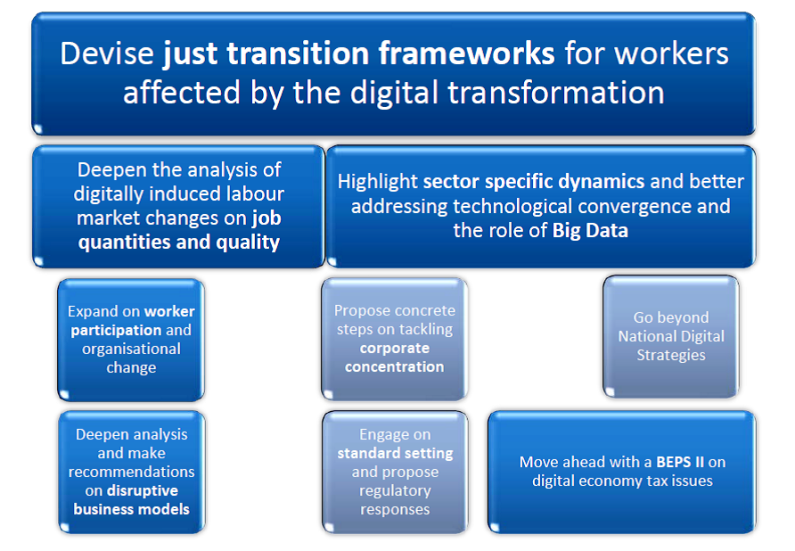The OECD Going Digital Project – Comments & Ways Forward
31 May 2018
The interim report of the Going Digital horizontal project released for the MCM 2018 provides good insights on where the OECD stands on developing policy recommendations to address the digital transformation of our economies.
The OECD report acknowledges that digital business models are putting “conventional notions” of location, distance and jurisdiction to the test, and hence the overall regulatory treatment of value creation, business operations and organisational change. The report however remains ambiguous on how to address these challenges, suggesting a combination of self-regulation, voluntary standards, revision of some existing regulation and sharing of best practices.
The report steers away from giving an alarming message on the quantity of jobs by stating that “there is no evidence that, to date, technological change has been associated with job losses overall”. The newest OECD automation data estimate 14% of jobs being at high risk of automation. It endorses fair transition frameworks as a way forward and discusses the role of social dialogue. On new non-standard forms of work (NSFW), the OECD rightly points to disruptive business models that circumvent “taxes and regulations on regular contracts” but fails to draw the necessary conclusions how to tackle this. NSFW are also discussed fas an “important source of income and flexibility for workers”, which is highly debatable, while the discussion on whether labour market institutions are fit for purpose remains inconclusive.
Moving forward and as the OECD project will culminate with final report and an integrated policy framework in March 2019 specific steps would need to be taken to deliver an outcome that is both comprehensive and actionable including by:
- Devising just transition frameworks for workers affected by the digital transformation
- Deepening the analysis of digitally induced labour market changes on job quantities and quality
- Highlighting sector specific dynamics and better addressing technological convergence and the role of Big Data
- Expanding on worker participation and organisational change
- Deepening analysis and make recommendations on disruptive business models
- Moving ahead with a BEPS II on digital economy tax issues
- Proposing concrete steps on tackling corporate concentration
- Engaging on standard setting and propose regulatory responses
- Going beyond National Digital Strategies.
Download the full assessment on the right.

TUAC Key Recommendations going forward
